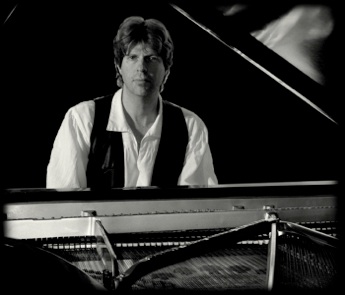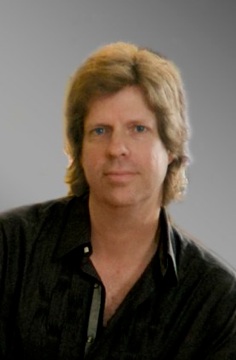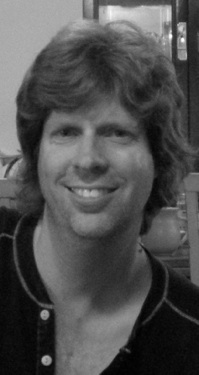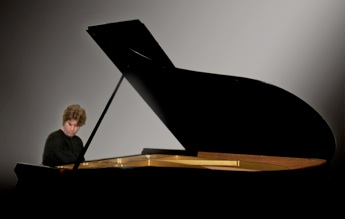One of the things I really love about reviewing CDs is discovering artists that I might not have ever heard otherwise. With some, that wouldn’t have been a major loss, but then there are artists like David Glass, whose music is so good that I can’t understand why they haven’t become well known. David is an artist that I wish I had encountered while I was still in the Bay Area. He had a performing career as a classical pianist for about twenty years, has been a piano teacher in Piedmont, CA for seventeen years, and released his first CD of original material, “Beginning the Journey,” in 2007. I think you’ll enjoy getting to know him as much as I have.
KP: Did you grow up in Oakland, CA?
Glass: I was born in Castro Valley, CA, fifteen miles south of Oakland, and lived there until I finished high school. I lived in Boston, Mass. for five years while studying at the New England Conservatory of Music and then came back to California and ended up in Oakland where I have been ever since.
KP: When did you start playing the piano?
Glass: I started lessons when I was eight years old. I was not yet a serious student and studied piano with a sweet, elderly lady named Janet Evans who was not a demanding teacher. My mother thought that was good as she was concerned I might want to quit piano if it was too demanding. Her intuition was correct as I stayed with her until 9th grade. However, I did develop a strong interest in music when I was in 6th grade as a result of my love for the rock band Emerson, Lake and Palmer. From there I began listening to more classical, jazz, and progressive rock music. In 10th grade I started more intensive studies with pianist/conductor James Gardner and jazz pianist/conductor Frank Sumares that lasted until I graduated from high school. I continued my piano studies at NEC with Jacob Maxin and Patricia Zander. They were my last instructors.
KP: How much performing did you do as a classical pianist?
Glass: After I graduated from the Conservatory, I performed quite a bit as a solo classical pianist as well as participating in concerts with other musicians. Prior to that, I was in several rock and jazz ensembles and played with some really talented musicians such as saxophonist David Mann (Tower of Power) and Trumpet/film scorer Jeff Beal (Monk, Ugly Betty). However I preferred being a solo artist and performed classically for about twenty years.
KP: Was your first recording the improvised duet album?
Glass: Yes. I collaborated with pianist Francis Martineau and released “On Course: Improvised Piano For Four Hands.”
KP: How did that recording come about?
Glass: I met Francis through one of my students and heard him perform a solo concert in which his entire program was improvised. I introduced myself to Francis and we agreed to get together and play. It took a few years before we actually got together, but once we did, we discovered we had a unique chemistry for improvising duets. It was Francis’s idea to go to a recording studio. Having never recorded before I thought it would be a fun experiment. We ended up at Mesa Recording in Sebastopol, CA with Kenny Evans as the recording engineer. We had a great time that day, and I have to say the music went into some very interesting realms. We were not trying to be commercial at all - quite the contrary - and it was a very therapeutic session for us. It’s an amazing experience to sit with another pianist at the piano, not knowing what you are going to play, and then the recording engineer gives you the thumbs up to start, and away you go. It was Francis’s idea to make a CD, and my reaction was “you’re kidding?” He convinced me it was worth pursuing, and I will admit it’s very raw playing. The CD is unedited and there are a few weak spots in it, but overall there are some amazing moments throughout the disc. I’m very proud of the CD. We later performed live throughout California and Oregon, doing both two- and four-hand improvisations. Francis and I are the best of friends, and he was the catalyst that got me to start recording as a solo pianist.
KP: What led you to record the Liszt solo piano transcription of Beethoven’s “Pastoral Symphony”?
Glass: After completing “On Course,” I decided I wanted to do a solo CD. I wanted it to be something classical mainly because classical piano had been a big part of my performing career, but I also wanted to do something unique, not music that thousands of other pianists had already recorded. I became familiar with the Liszt piano transcription of Beethoven’s 6th symphony back in the early 1980’s. I heard a wonderful world premier recording of the transcription performed by Cyprien Katsaris. I recall being blown away by both the performance and the transcription, and found the transcription more interesting than the original orchestral version. My wife bought me the sheet music as a Valentines gift in the late 80’s and I was astonished by how difficult it was. I began picking at it from time to time, but finally made a commitment to learn it around 2004. That was when I did some research on the web and discovered that only eight recordings of the transcription existed. That contributed to my decision to record the symphony. It may actually be the American premier. Since then, I have stopped playing classical music. It was time for a change.

KP: When did you start composing?
Glass: When I was five, I started improvising at the piano a lot. This was before I started taking piano lessons. Unfortunately, my first teacher didn’t encourage me to improvise or compose. She gave me the basic rudiments of reading notes and playing easy classical music, but I stopped making my own music until my third year of high school Along with my classical playing, I began studying jazz piano and started arranging music for my high school jazz band and string orchestra, (which included Chick Corea’s “Night Streets” and Emerson, Lake and Palmer’s “Endless Enigma”). I continued composing and arranging for jazz bands during my one year at Cal State Hayward. I composed my first piano piece during my time at NEC, entitled “Sketches of Ogunquit,” which depicted ocean scenes along the coast of New England. I did a lot of experimental improvising back then as well. After graduating from NEC, I studied film scoring and electronic music during my graduate years at San Jose State. Years later, I started my own private piano studio and began writing music for my piano students.
Oddly enough, “Beginning The Journey” represents my first “full time” commitment to composing and improvising as a solo artist. I sometimes marvel at how long it took me to get to that point, but there were a lot of major distractions that kept me from pursuing my own creativity. Fortunately that’s changing and I’m composing and improvising more often.
KP: How long of a time span did it take to compose the music for “Beginning The Journey”?
Glass: Most of the music was either composed or improvised between 2006-2007, but many fragments throughout the CD were adapted from years of experimenting at the piano. The track “Blind Beach” was an adaptation of a string improvisation I did on my portable Casio keyboard back in 2004. “Cry of the Sea,” although mostly improvised, uses some effects I used in “Sketches of Ogunquit” and other past endeavors. The beginning themes in “Starlight Before Dawn” and “November Sky” were originally composed back in 2003 on my Casio when I was camping in the mountains. They, too, were originally conceived using a sustained string sound, so the final versions on BTJ are completely different from the original versions.
KP: When did you start teaching the piano?
Glass: I had a few students during my college years, but I started teaching full-time around 1987. I didn’t intend for it to be a full time position. I taught a few students in Piedmont, CA (next to Oakland) as a way of making some side money until I could figure out what I was going to do next. Before I knew it, I had nearly a hundred families calling me to teach their children! It was hard to say “no,” as everyone really appreciated me and I discovered I enjoyed working with children of all ages. I have been teaching sixty students a week for the past seventeen years.
KP: Man! I thought forty-five students was a load! Do you teach much of your own music?
Glass: After releasing “Beginning the Journey,” I have had many of my high school students wanting to play my music. I didn’t write any of it out, so I have begun to transcribe several of the pieces. Presently, I am teaching “Leaf On A Stream,” “New Beginnings,” “Blind Beach,” and “Sun River.” A few colleagues want to have the music to “Red Horizon,” “Cry Of The Sea,” and “Starlight Before Dawn,” so I have my work cut out. I occasionally write music for my younger students. They are mostly novelty pieces that I have fun working on with my students. My favorite was a piece entitled “The Deep” (2002). The music is based on a small story depicting a crew of submarine explorers traveling the depths of the sea and the perils they encounter. It was composed for four of my 6th grade students who were inspired by the idea of performing with two grand pianos and four performers. They performed it for their piano recital and did a fabulous performance. (See:
YouTube.).
KP: It’s really a fun video to watch! Have you performed your own music much yet?
Glass: I recently performed in the UK. I was invited to play for a fund raising event at the ACS Cobham International School in Surrey. There were approximately 700-800 people who attended. I have recently performed in several local concerts throughout the San Francisco Bay Area. For my own enjoyment, I drive up the Sonoma coast and stay at a lodge called The Timbercove Inn. It’s a rustic lodge that has a beautiful lobby with a small grand piano. During the time I was making BTJ, I would spend a few nights up there and play for the guests for free. I wanted to see what their reactions were to my music and get their feedback. If I felt they were enjoying it, I would make plans to go into the studio and record.
KP: You have mentioned that most of your students and their parents like your shorter, more melodic pieces rather then the longer ones that I am the most excited about. It seems that people’s attention spans have gotten shorter and shorter. When I was in my later teens and in college, we thought nothing of sitting in the dark listening to music for hours and felt better for the experience. How do you see this culture of instant gratification affecting music and other arts?
Glass: I’ve struggled with that issue for years. It seems any music that is more than five minutes long or has any depth or musical interest just goes over most heads. I discovered being a classical pianist had its limitations for the same reason. Both of my first two CDs have a limited audience because most people don’t have the capacity or time to immerse themselves in something meaningful or intriguing. Only my artistic circle of friends appreciate music that is conceptually long. When I made BTJ, I really had to pull on the reins. I was frustrated and wanted to reach a wider audience, but I didn’t want to compromise my spirit. I had to be sure there was a balance of short and long pieces as well as contrasting moods. I remember in the 70’s, my friends and I would hang out and listen to classical music, jazz, and progressive rock. We enjoyed music that was counter culture and made us think. I think when MTV came along, it contributed to the lack of attention spans of the general public. Radio stations are also responsible. It’s all about marketing.
KP: Have you found that piano students are much less willing to practice and work at getting better at their instrument than, say, ten years ago? How do you keep them interested?
Glass: Oh yes. There has been a huge shift in my studio over the past seventeen years. I used to have more students interested in classical and jazz piano. I had a lot of serious students, many who have gone on to pursue their own music careers. In the past ten years, I have noticed a lack of interest in classical music. Many of my students want to play only rock/pop songs or soundtrack music. I have no problem with that, except I want them to have more exposure to other types of music, too. I found out early in my teaching career that I had to be really energetic, funny, and emotionally in tune with each individual student just to keep them interested. It works, but I’m finding it more difficult to keep up as the years go on.
KP: That’s one of the reasons I moved to Oregon. I just felt really drained at the end of a week, and it felt like so much of the creativity had gone out of teaching. It really makes me wonder what the future holds for the arts.
Are you planning to release sheet music of your pieces?
Glass: I would like to, but only if there is a demand for it. I’ve discovered that it takes a lot of time and money to make it available for sale online.
KP: Who and what are your biggest musical influences?
Glass: Classically, I would have to say Chopin, Beethoven, Debussy, Liszt, Ravel, Rachmaninoff, Bartok, Hovhaness, and Prokofiev. Classical pianists I credit are Cyprien Katsaris as well as Ashkenazy, Horowitz and dozens of others. I love Bill Evans and Keith Jarrett as jazz pianists, and I wouldn’t have gotten into music if not for Keith Emerson of Emerson, Lake and Palmer. I would still love to be in a progressive rock band. Two years ago and for the very first time, I began listening to George Winston and really love his first CD, “Autumn,” as well as “Montana: A Love Story.” Since then, I have been listening to a lot of Whisperings Solo Piano Artists. It’s interesting that I started listening to contemporary solo pianists only after making BTJ. I found them online as a result of my trying to figure out where I and BTJ belong.
KP: Quite a few of your pieces are about the ocean and the California coast. Do you spend a lot of time at the ocean?
Glass: As much as I can. The majority of my time is spent teaching ten months out of the year, six and occasionally seven days a week. It takes a lot of energy. Lately, I need a lot of solitude in order to decompress and the California coast is one of the best places for me to do that. Lately, I am fond of a beach called Blind Beach, located about two-hours north of San Francisco. It’s a beautiful beach that spans over a mile and has a large rock with a big hole in the middle. It sits out in the water about a half-mile off the coast. Usually there is no one there when I go and I love having the whole area to myself. One of my tracks on BTJ is named after that beach. The Timbercove Inn is located thirty minutes north of Blind Beach and is next to a fantastic coastline with beautiful cliffs and rocks. I think my improvisation “Cry Of The Sea” was inspired by that area. I also love the mountains and the Wine Country. Both are also inspirations for my music.
KP: Who are some of your favorite classical composers to play?
Glass: I would have to say I have favorite pieces more then I have favorite composers. I love the Liszt transcription of the Pastoral Symphony; I love Ravel’s “Jeux D’eau” and “Une barque sur l'océan.” Another favorite is Grieg’s “Holdberg Suite.” Years ago, I started transcribing Debussy’s orchestral work “Sirens” for solo piano that I would love to finish and record. I love Rachmaninoff’s “Elegy” and “A Minor Etude Tableaux.” I adore Chopin’s Ballades, Scherzi, Sonatas and Nocturnes. To get the beast out of me, I love playing Prokofiev’s “Toccata.” I also get a kick out of playing Emerson, Lake and Palmer’s “Benny The Bouncer.” I have hundreds of others.
KP: What has been your most exciting musical experience to date?
Glass: Performing in Europe last April was a high point. I loved recording “On Course” with Francis Martineau as well as performing on the road with him. Making BTJ was a moving experience for me, and “New Beginnings” from BTJ was used in a documentary film produced by Emmy Award winner Dan Pinkham. I enjoy all of the student recitals, but I would have to say that “The Deep” was a milestone. Taking several of my students to Mesa Recording Studio to record their own music was also very gratifying. Having people like Robin Williams and Bill Cosby come up to me and say they liked my playing was exhilarating. Perhaps one of the most touching moments in my teaching career was back In 1999 when the families of my studio raised money so I could purchase a 7 ft. Steinway. I knew nothing about it. They all surprised me with the gift at a student recital. Needless to say I was brought to tears. The list goes on. However, the most exciting thing for me is when I touch someone's heart with my music. Nothing compares to the experience of when someone comes up to me and says they love my music. That’s more important to me than money or fame. That’s part of the reason why I love music. I can connect with people in a way that goes beyond communicating with words.
KP: Are you composing new music?
Glass: I have a few ideas I’m working on. I’m also improvising a lot. I seem to go through stages where things are slow for a season, then all of a sudden, music starts pouring out. I’m not sure what my next direction is with regards to making a new CD. Many people would like me to make another BTJ. I would consider that if there was enough public interest. I also would consider making another classical CD. There’s also my progressive rock ambition and film scoring interest. Time will tell.
Kathy Parsons
October 2008




